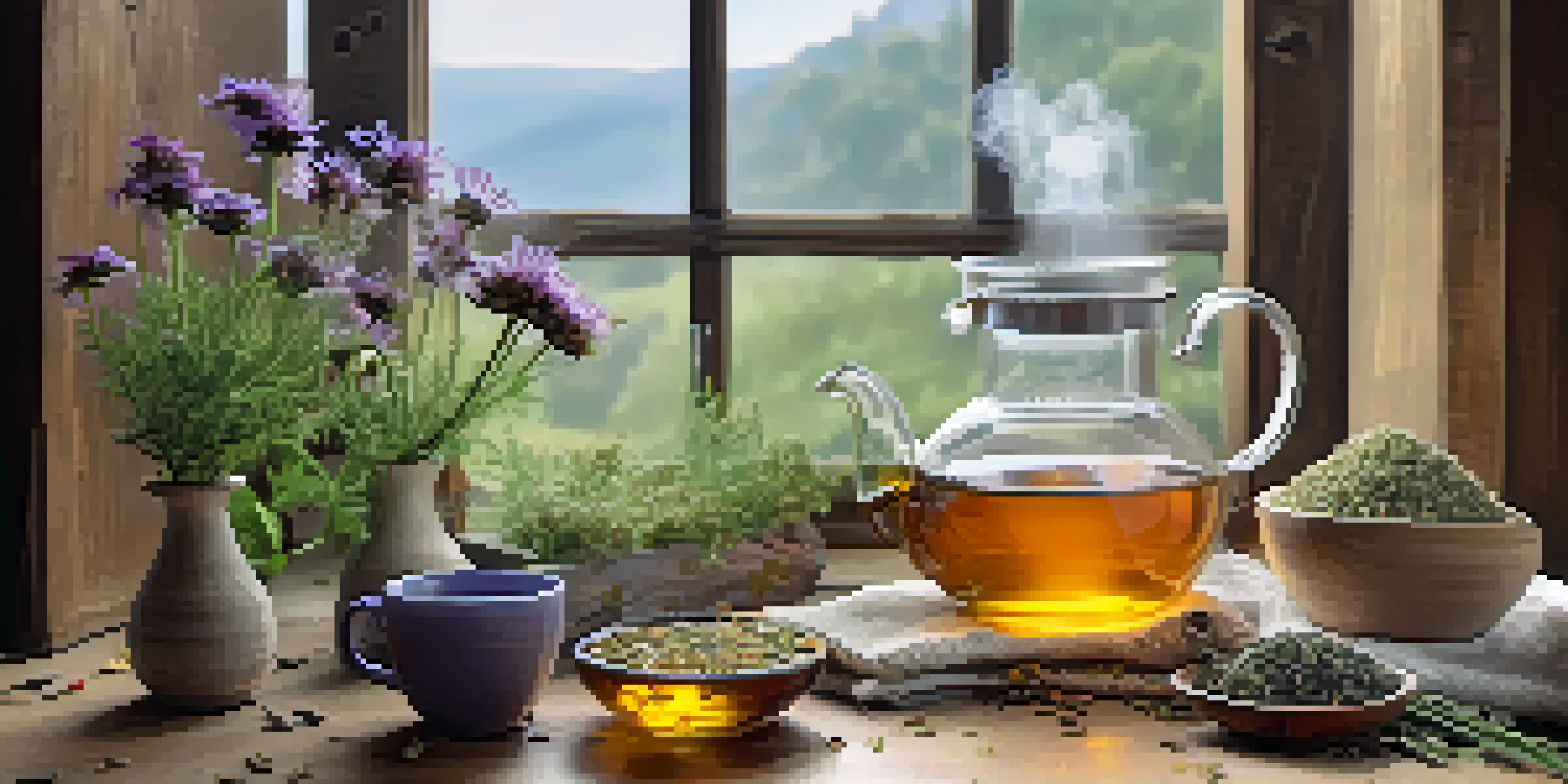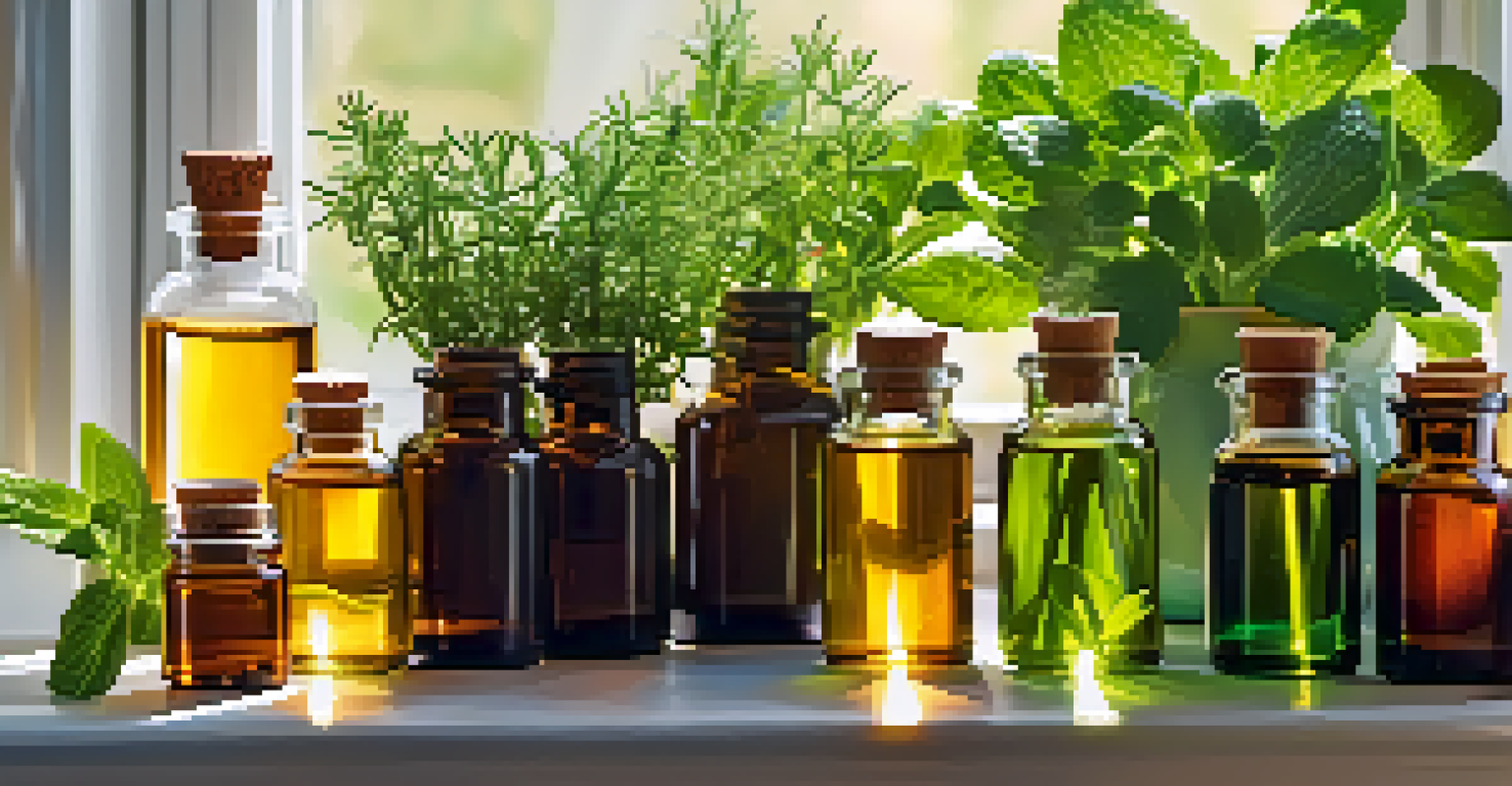Combining Essential Oils with Herbal Remedies in Naturopathy

Understanding Naturopathy and Its Foundations
Naturopathy is a holistic approach to health that emphasizes the body's innate ability to heal itself. It combines various natural therapies, including herbal medicine, nutrition, and lifestyle changes. By focusing on treating the root cause of illnesses rather than just symptoms, naturopathy offers a unique perspective on wellness.
The natural healing force within each of us is the greatest force in getting well.
One of the core principles of naturopathy is the use of natural substances, such as plants and essential oils, to promote healing. This approach aligns with the belief that nature provides the best remedies for our ailments. Understanding the synergy between these elements is essential for anyone interested in natural health.
Essential oils are concentrated extracts from plants that capture their aromatic and therapeutic properties. When combined with herbal remedies, they can enhance the healing process, offering a more comprehensive treatment plan. This combination can be particularly effective for various health issues, from stress relief to digestive support.
The Role of Essential Oils in Naturopathy
Essential oils play a pivotal role in naturopathy due to their potent therapeutic effects. They can be used in various forms, such as aromatherapy, topical application, or even ingestion under professional guidance. Each essential oil has unique properties, making them suitable for different health concerns.

For example, lavender essential oil is renowned for its calming effects, making it a popular choice for anxiety and sleep issues. On the other hand, peppermint oil can aid digestion and provide relief from headaches. By understanding these properties, practitioners can tailor treatments to individual needs.
Naturopathy Emphasizes Natural Healing
Naturopathy focuses on the body's ability to heal itself using natural therapies like herbal medicine, essential oils, and lifestyle changes.
Moreover, the aromatic nature of essential oils can enhance the overall experience of herbal remedies. The pleasant scents often elevate mood and promote relaxation, creating a holistic approach to healing. This sensory interaction can result in a more effective and enjoyable treatment experience.
Exploring Herbal Remedies in Naturopathy
Herbal remedies have been used for centuries in various cultures to treat ailments and promote health. These natural treatments are derived from plants and can come in the form of teas, tinctures, or capsules. Each herb carries unique properties that can support different aspects of health.
Nature does not hurry, yet everything is accomplished.
For instance, chamomile is well-known for its soothing effects on the digestive system and its ability to promote sleep. Similarly, echinacea is often used to bolster the immune system. By incorporating these herbs into a naturopathic plan, individuals can benefit from their natural healing properties.
The versatility of herbal remedies allows them to be combined with essential oils for enhanced effects. This fusion can create powerful blends that target specific health issues more effectively than either treatment alone. Understanding the best combinations is key to maximizing their benefits.
Synergistic Effects of Combining Oils and Herbs
One of the most exciting aspects of naturopathy is the synergistic effects that can arise from combining essential oils with herbal remedies. When these two elements work together, they can enhance each other's therapeutic properties, leading to improved outcomes. This synergy is rooted in the idea that the whole is greater than the sum of its parts.
For example, combining the calming properties of lavender oil with chamomile can create a powerful blend for anxiety relief. This combination not only enhances relaxation but also promotes better sleep. Such blends can be tailored to individual needs, creating a personalized approach to healing.
Synergy of Oils and Herbs Enhances Healing
Combining essential oils and herbal remedies can create powerful blends that improve health outcomes and reduce potential side effects.
Moreover, this synergy can also help to reduce potential side effects. By using lower doses of each component, individuals may experience fewer adverse reactions while still benefiting from their combined effects. This makes the pairing of essential oils and herbal remedies a thoughtful choice in naturopathy.
Safety and Precautions in Using Oils and Herbs
While essential oils and herbal remedies offer numerous benefits, it is crucial to approach their use with care. Not all oils and herbs are safe for everyone, and some may interact negatively with medications or existing health conditions. Consulting with a qualified naturopathic practitioner is essential to ensure safety.
For instance, certain essential oils can cause skin irritation if applied directly without proper dilution. Similarly, some herbs may not be suitable for pregnant or nursing women. Understanding these precautions can help individuals make informed choices about their health.
Additionally, quality matters when it comes to essential oils and herbal products. Choosing reputable brands that prioritize purity and ethical sourcing can significantly impact effectiveness and safety. This diligence ensures that individuals receive the best possible care from their natural remedies.
Creating Effective Blends of Oils and Herbs
Creating effective blends of essential oils and herbal remedies involves understanding the specific properties of each component. It's essential to consider the desired outcome and choose ingredients that complement each other. This thoughtful approach can lead to powerful, natural remedies.
For example, when crafting a blend for respiratory support, combining eucalyptus oil with peppermint and thyme can offer a refreshing and invigorating experience. Each ingredient contributes its unique benefits, working together to promote clearer breathing and overall wellness. Experimentation is key to finding the right combinations.
Safety is Key in Natural Remedies
Consulting a qualified practitioner and choosing high-quality products are essential for safely integrating essential oils and herbs into wellness practices.
It's also helpful to start with small batches when trying out new blends. This allows for adjustments based on personal preferences and reactions. Keeping a journal of what works can assist in refining these recipes and developing a deeper understanding of the healing properties of each ingredient.
Integrating Oils and Herbs into Daily Life
Integrating essential oils and herbal remedies into daily life can be a rewarding experience. Simple practices like diffusing essential oils at home or enjoying herbal teas can enhance overall well-being. These small changes can have a significant impact on mental and physical health.
For instance, incorporating a morning ritual of herbal tea can set a positive tone for the day. Adding a few drops of essential oil to a bath can create a relaxing oasis after a long day. These practices not only promote health but also encourage mindfulness and self-care.

Furthermore, sharing these practices with family and friends can create a supportive community around natural wellness. Educating others about the benefits of essential oils and herbs can foster a collective appreciation for naturopathy. This communal approach enhances both individual and collective health journeys.